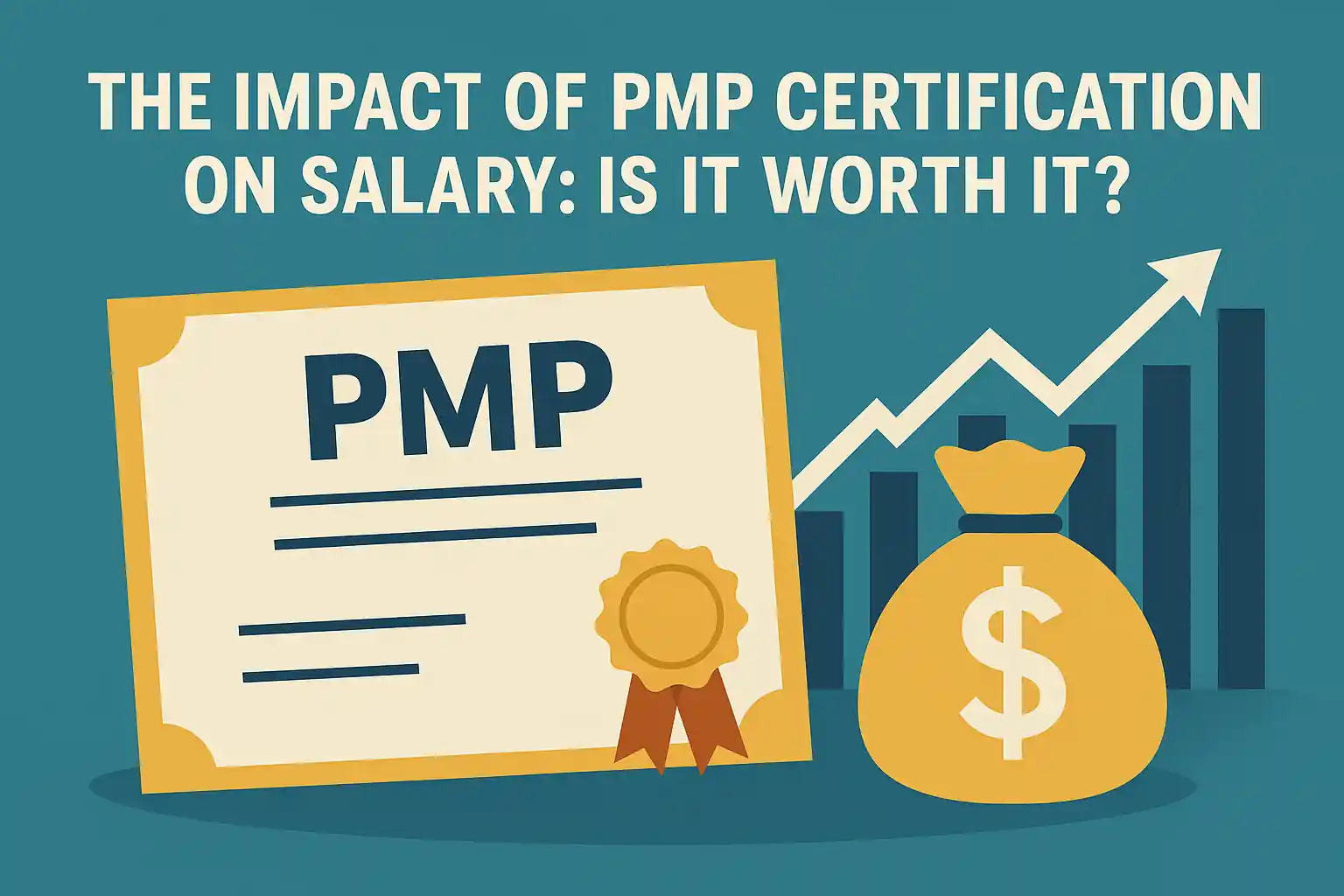Introduction
The Project Management Professional (PMP) certification has emerged as a hallmark of excellence and expertise. Offered by the Project Management Institute (PMI), this certification signifies that an individual possesses the necessary skills, knowledge, and experience to lead and direct projects effectively. As organizations increasingly recognize the value of certified project managers, the PMP certification has become a sought-after credential for professionals aiming to advance their careers.
However, a critical question arises for many professionals considering this certification: Is PMP certification worth the investment? This inquiry is particularly pertinent in today’s competitive job market, where the financial implications of career decisions are paramount.
To address this question, we will delve into the statistical analysis of salary differences between certified and non-certified project managers. Research consistently indicates that PMP-certified professionals enjoy a significant salary premium compared to their non-certified counterparts. For instance, PMP holders earn a median salary of approximately $123,000 annually, which is about 32% higher than the $93,000 median salary of non-certified project managers [10][13]. This substantial difference underscores the potential financial benefits of obtaining the PMP certification.
In this discussion, we will explore the various factors contributing to these salary disparities, providing insights that can help professionals make informed decisions about pursuing PMP certification. By examining the data and trends surrounding project management salaries, we aim to clarify whether the investment in PMP certification is justified in terms of financial returns and career advancement opportunities.
Understanding PMP Certification
The Project Management Professional (PMP) certification is a globally recognized credential offered by the Project Management Institute (PMI). Established in 1969, PMI is a leading professional association for project management, dedicated to advancing the profession through standards, certifications, and resources. The PMP certification signifies that an individual possesses the knowledge, skills, and experience necessary to lead and direct projects effectively, making it a valuable asset in the competitive field of project management [9].
Requirements to Obtain PMP Certification
To qualify for the PMP certification, candidates must meet specific educational and professional experience criteria:
- Education: Candidates must have a secondary degree (high school diploma, associate’s degree, or global equivalent) along with 5 years of project management experience, or a four-year degree (bachelor’s degree or global equivalent) with 3 years of project management experience.
- Project Management Experience: This experience must include leading and directing projects, with a minimum of 7,500 hours spent in a leading role for those with a secondary degree, or 4,500 hours for those with a four-year degree.
- Exam: Candidates must pass a rigorous exam that tests their knowledge of project management principles, practices, and methodologies [9][11].
Importance of PMP Certification in the Project Management Field
The PMP certification holds significant value in the project management profession for several reasons:
- Career Advancement: It is often a prerequisite for higher-level project management positions, making it essential for professionals looking to advance their careers.
- Increased Earning Potential: Studies have shown that PMP-certified professionals can earn significantly higher salaries compared to their non-certified counterparts. For instance, PMP certification can increase salary by up to 44%, reflecting the advanced skills and knowledge that certified individuals bring to their roles [12][13].
- Global Recognition: The certification is recognized worldwide, providing professionals with opportunities to work in various industries and locations, enhancing their job security and marketability [11][14].
Salary Overview for Project Managers
When considering the value of obtaining a Project Management Professional (PMP) certification, one of the most compelling factors is the potential impact on salary. Here’s a statistical analysis of salary differences between certified and non-certified project managers, along with an overview of the current salary landscape in the industry.
Current Average Salary for Project Managers
The median annual wage for project management specialists was reported to be approximately $98,580 as of May 2023. However, this figure can vary significantly based on several factors, including the individual’s experience, the specific industry they work in, and their geographical location. For instance, project managers in the United States earn an average salary of around $90,000 per year, which reflects the higher demand and cost of living in many regions of the country [3][8].
Factors Influencing Project Manager Salaries
Several key factors influence the salaries of project managers:
- Experience: As with many professions, experience plays a crucial role in determining salary levels. More experienced project managers typically command higher salaries due to their proven track record and expertise.
- Industry: Different industries offer varying salary scales for project managers. For example, project managers in the technology and finance sectors often earn more than those in non-profit or public sectors. The highest median salaries for project practitioners are reported in the United States, at $120,000, followed by Australia at $103,789 [5].
- Location: Geographic location significantly affects salary levels. Project managers in urban areas or regions with a high cost of living tend to earn more than those in rural areas. For instance, project managers in the United Arab Emirates managing small teams report a median salary of $66,383, which is lower compared to their counterparts in more developed economies [7].
Importance of Credentials in Determining Salary Levels
Credentials, particularly the PMP certification, are increasingly recognized as a valuable asset in the project management field. Data indicates that project managers with PMP certification earn a median wage of $130,000 per year, which is a 44% increase over their non-certified peers [2]. Furthermore, those with PMP certification report an average income that is 27% higher than those without it [6]. This highlights the significant financial benefits that can accompany obtaining this certification.
Statistical Analysis: Salaries of Certified vs. Non-Certified Project Managers
When considering the value of obtaining a Project Management Professional (PMP) certification, one of the most compelling factors is the potential impact on salary. Numerous studies and surveys have consistently shown that certified project managers tend to earn significantly more than their non-certified counterparts. This section delves into the statistical analysis of salary differences, drawing from reliable sources such as the Project Management Institute (PMI) salary surveys and industry reports.
Salary Differences Between Certified and Non-Certified Project Managers
- Higher Median Salaries for Certified Professionals: According to PMI’s salary survey, project managers holding a PMP certification earn a median salary of approximately $130,000, which is notably higher than the median salary of non-certified project managers, which stands at around $121,000. This represents a substantial difference of about 33% in favor of certified professionals [3][6][8].
- Recent Trends: Over the past few years, the average yearly salary for PMP-certified project managers has increased by $7,000, while non-certified project managers have seen a decrease of $3,000 in their average salaries. This trend underscores the growing value of certification in the job market [5][7].
Variations Based on Experience Levels and Industries
- Experience Matters: The salary gap between certified and non-certified project managers can also vary based on experience. For instance, entry-level project managers with a PMP certification may earn more than their non-certified peers, but the disparity becomes even more pronounced at senior levels. Experienced project managers with PMP certification report significantly higher salaries, reflecting the premium placed on certified expertise in the field [4][8].
- Industry-Specific Differences: The impact of PMP certification on salary can also differ across industries. For example, project managers in technology and finance sectors often see higher salary increments associated with certification compared to those in non-profit or public sectors. This variation highlights the importance of industry context when evaluating the financial benefits of certification [7][9].
Benefits Beyond Salary: The Value of PMP Certification
When considering the financial implications of obtaining a Project Management Professional (PMP) certification, it’s essential to look beyond just salary increases. While the potential for higher earnings is a significant factor, the certification also offers a range of additional benefits that can influence a professional’s career trajectory and financial decisions. Here are some key points to consider:
- Career Advancement Opportunities: PMP certification is widely recognized in the industry and can open doors to senior project management roles. Many organizations prefer or require certification for higher-level positions, which can lead to promotions and increased responsibilities. Certified professionals often find themselves better positioned to navigate career changes and secure high-profile projects, enhancing their overall career prospects [1][4][7].
- Increased Job Security and Demand: The demand for certified project managers continues to grow, as organizations increasingly recognize the value of formal training and certification. Certified professionals report easier access to international career opportunities, with 70% indicating that their certification has positively impacted their job security. This heightened demand can lead to more stable employment and reduced risk of job loss, making the investment in certification worthwhile [6][8].
- Networking Opportunities and Professional Development: Becoming a PMP not only enhances your resume but also connects you with a vast network of professionals through the Project Management Institute (PMI). Membership provides access to exclusive resources, events, and forums where you can engage with other project management professionals. This networking can lead to mentorship opportunities, collaborations, and insights into industry trends, all of which can contribute to your professional growth and career advancement [2][3][5].
Cost of PMP Certification: Weighing the Investment
When considering the pursuit of a Project Management Professional (PMP) certification, professionals often weigh the costs against the potential financial benefits. This section will provide a detailed breakdown of the costs involved in obtaining the certification, the time investment required for preparation, and an analysis of the return on investment (ROI) based on salary increases.
1. Breakdown of Costs Involved
The costs associated with obtaining a PMP certification can vary significantly, but they generally include the following components:
- Exam Fees: The PMP certification exam fee is a major expense. As of 2024, the fee is $405 for members of the Project Management Institute (PMI) and $555 for non-members. Becoming a PMI member incurs an additional cost of $129, plus a one-time application fee of $10, which can ultimately reduce the exam fee for members [6][10][11].
- Study Materials: Candidates should also budget for study materials, which can range from $200 to $500, depending on the resources chosen. This may include books, online courses, and practice exams [13].
- Training Courses: Many candidates opt for formal training courses to prepare for the exam. These courses can cost anywhere from $750 to $3,000, depending on the provider and the format (in-person or online) [8][13].
2. Time Investment Required for Certification Preparation
Preparing for the PMP certification requires a significant time commitment. Candidates typically spend around 35 hours in formal training, in addition to several weeks or months of self-study. On average, professionals may invest 100 to 150 hours in total preparation time, depending on their prior knowledge and experience in project management [1][8].
3. Analysis of Return on Investment (ROI)
The financial benefits of obtaining a PMP certification can be substantial. Numerous studies indicate that PMP-certified professionals earn significantly higher salaries compared to their non-certified counterparts. For instance, PMP-certified project managers in the United States earn a median salary of approximately $130,000 per year, while those without the certification earn around $93,000 [3][14]. This represents a salary increase of about 33% for certified professionals.
To quantify the ROI, consider the following example: if a PMP certification leads to a potential increase in annual salary of $30,000, and the total cost of obtaining the certification (including exam fees, study materials, and training) is approximately $2,900, the ROI can be calculated as follows:
- ROI = Potential Salary Increase / Cost of Certification
- ROI = $30,000 / $2,900 = 10.34 or 1034%
This calculation illustrates that the financial return on investment for obtaining a PMP certification can be exceptionally high, making it a worthwhile endeavor for many professionals [2].
Case Studies and Testimonials
The Project Management Professional (PMP) certification is widely recognized in the industry as a benchmark for project management excellence. For professionals considering this certification, understanding its financial implications is crucial. Below, we explore real-world examples and testimonials that illustrate the significant salary increases and career advancements associated with obtaining PMP certification.
Success Stories of Certified Project Managers
- General Salary Increase: A recent study indicated that PMP-certified professionals earn, on average, 20% more than their non-certified counterparts. This statistic underscores the financial advantage of certification, making it a worthwhile investment for many project managers [6][4].
- IT Sector Example: In the technology-driven IT sector, project managers who obtained PMP certification reported salary boosts of up to 20%. This increase reflects the high demand for certified project managers in a rapidly evolving industry, where expertise in project management methodologies is crucial for success [7][4].
- Telecommunications Industry: PMP-certified project managers in the telecommunications sector have demonstrated a 20% improvement in project schedule adherence. This not only enhances their value to employers but also often translates into higher salaries due to their ability to deliver projects on time and within budget [11].
Testimonials from Professionals
- John D., Senior Project Manager: “Before I earned my PMP certification, I was struggling to get noticed in a competitive job market. After obtaining my certification, I received a promotion and a 25% salary increase within six months. The certification not only validated my skills but also opened doors to new opportunities.”
- Sarah L., Project Coordinator: “I was hesitant to invest in the PMP certification due to the costs involved. However, after completing the certification, I was offered a new position with a 30% salary increase. The knowledge I gained was invaluable, and the financial return was immediate.”
- Michael R., IT Project Manager: “In my experience, the PMP certification has been a game-changer. I transitioned from a mid-level project manager to a senior role, and my salary jumped by 40%. The certification gave me the confidence and credibility I needed to take on larger projects.”
Industry-Specific Examples of Salary Growth
- Energy Sector: PMP-certified project managers in the energy sector have been noted for their contributions to project efficiency, leading to significant salary increases. The ability to manage complex projects effectively has made these professionals highly sought after, resulting in compensation packages that reflect their expertise [11].
- Construction Industry: In construction, PMP certification is often a prerequisite for higher-level project management roles. Certified professionals frequently report salary increases of 15-30% when moving into project management positions that require PMP credentials, highlighting the certification’s value in this field [4].
Conclusion: Is PMP Certification Worth It?
In evaluating the worth of Project Management Professional (PMP) certification, a significant focus is placed on the financial implications, particularly salary differences between certified and non-certified project managers. Statistical evidence consistently indicates that PMP certification can lead to substantial salary increases. For instance, PMP-certified individuals earn approximately 16% more than their non-certified counterparts globally, according to Forbes [13]. Additionally, survey data reveals that those with PMP certification can expect a salary boost of around 20% on average compared to those without it [7]. This trend is further supported by reports indicating that PMP certification holders report median salaries that are 26% higher than those lacking the certification [5].
However, the value of PMP certification extends beyond mere financial gain. It enhances credibility within the industry, as companies recognize the rigorous standards and knowledge associated with the certification. This recognition can lead to greater job opportunities and career advancement, as PMP certification is often seen as a universal proof of project management skills and knowledge [15]. Furthermore, the certification fosters a sense of community among professionals, providing networking opportunities that can be invaluable for career growth, especially for those in hybrid or virtual work environments [3].
When considering whether to pursue PMP certification, professionals should reflect on their personal career goals and aspirations. While the financial benefits are compelling, the holistic advantages—such as increased credibility, networking opportunities, and a structured path for ongoing career development—should also be weighed. Ultimately, the decision to obtain PMP certification should align with individual career objectives and the specific demands of the project management field. By taking into account both the statistical evidence of salary differences and the broader benefits of certification, professionals can make a well-informed choice regarding their certification journey.
Find out more about Shaun Stoltz https://www.shaunstoltz.com/about/.
This post was written by an AI and reviewed/edited by a human.



